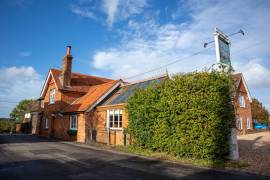Cellar to Glass: Counting on quality
Everybody knows what stock controllers do. They count things. So what is Ian Wylde, stock controller for Nottingham-based pubco Pub People, up to, poking his nose into beer quality?
Think about it, and it all makes wonderfully elegant sense. Bad beer equals lost sales and lost customers - and it also means lost stock. The most common problems - of temperature, dirty lines and cloudy beer - all cause waste, whether it's because of fobbing taps or an undrinkable product. That's a serious issue for a stock controller, although Ian still seems in a mild state of surprise about how the job has turned out.
So does his car. When he joined Pub People just over two years ago his employer expected him to be mostly office-bound. His company car was therefore a little Vauxhall Astra runabout. But Ian spends nearly all his time on the road, checking on beer quality in the expanding estate's 66 managed pubs and troubleshooting where problems arise. The car, its boot jammed full of cellar and dispense equipment, and a couple of kegs seat-belted in the back, is holding together well under the strain. But you sense it muttering that it didn't sign up for this.
Ian, though, is loving it. Since he joined the trade at 18, working at the old Home Brewery's brewery tap, he's had a passion for beer. He's run a couple of pubs himself, so he knows the day-to-day issues licensees face and enjoys communicating that passion and having a practical influence on improving quality at the pump.
As for the counting, he's got a team of stocktakers doing that, and when their reports reveal chronic beer stock losses at a pub, he'll go and investigate.
"It's really a mix of jobs," he says, "and it's surprised me how many things I get involved in. Mostly it's around quality. If the quality isn't right, your stocks aren't under control. A badly managed cellar can lose a pub two or three gallons of beer a week.
"A lot of licensees don't get the training they used to have," he adds, alluding to the changed relationship between brewers and pubs. Now that the majority of pubs aren't owned by brewers, pubs don't have direct access to beer expertise, although Ian is able to turn to Caledonian Brewery to run courses for licensees and staff.
The most common problems are familiar enough: cellar temperatures that are too high, poorly maintained equipment and, of course, dirty lines.
Pub People insists on managers cleaning their lines every seven days, and in two-thirds of its pubs the Brulines monitoring system flags up when it hasn't happened.
Cask beer from local brewers is an important selling point in many Pub People pubs, thanks largely to the enthusiasm of managing director Andy Crawford. The cask-conditioned product brings its own challenges, though, and that is where Ian especially hopes he is making a difference among the group's managers.
"They're understanding it better," he says. "Up to a couple of years ago licensees were frightened of it, they thought it was hard work. It's not - if you follow the correct procedures, you are clean and methodical, it looks after itself really. "And if the quality is right, word will get around and it can make all the difference to your business."













